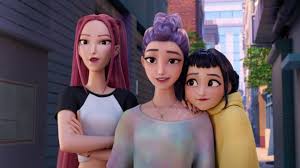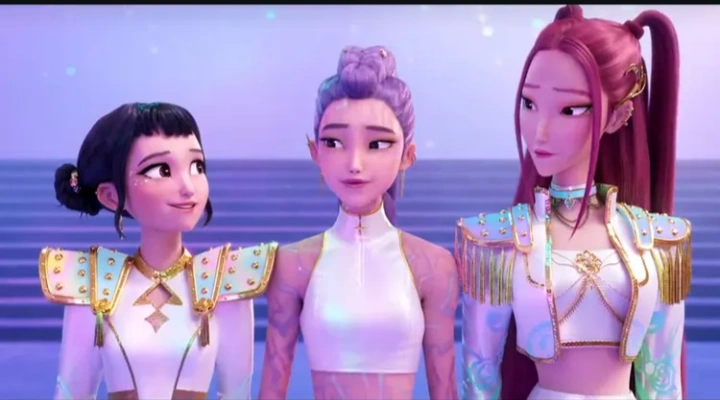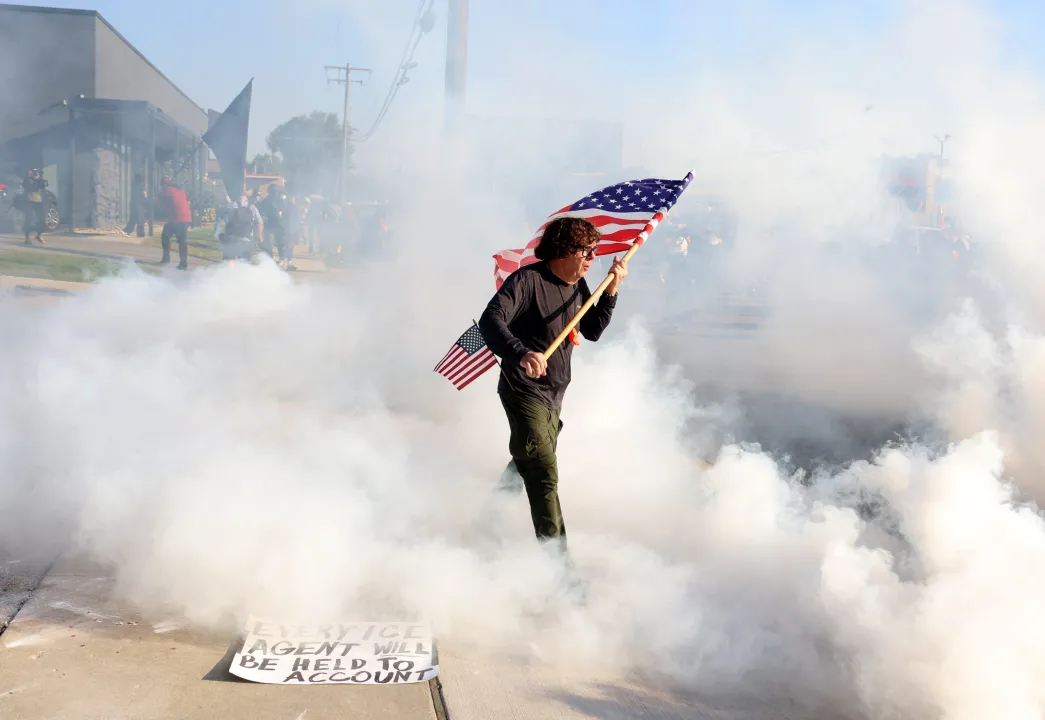If you ask me, shame is the real final boss of KPop Demon Hunters. Sure, there are demons lorded over by a soul-consuming mega-demon, but at its heart, this movie is about a fight so many of us know well: our struggle for acceptance, belonging, and becoming.
The story centers on a trio of demon hunters who battle demons, inspire community, and then weave that community together through song into a protective layer called the honmoon. Our family became instant super fans, enjoying our girls’ at-home concerts (pro tip - you can also stream a sing along version of the movie). I love the bold animation, Spider-verse-style action sequences, Korean cultural worldbuilding, and of course the music - seriously every song is a banger. The craft, sincerity and originality of this film bring sweet relief in a market saturated with corporate formulas and remakes. But what I want to talk about is the solid character building and psychological arc in this story.
Now, last I checked, KPop Demon Hunters has had 236 million views, making it the most popular Netflix movie of all time. However, if you haven’t had a chance to see this movie yet, this line is your personal honmoon. Bookmark this, go watch it, and then come back. If you breach this divider, I’m going to assume you have either watched it or are unbothered by the idea of spoilers.

Shame as the Hidden Villain
The trio - Rumi, Mira and Zoey - are also each on a journey to break free from the pain and isolation of shame. Beyond the pop performances, demon battles, and sincere community building with their fans, each of these protagonists carry wounds that feel deeply familiar to us. In psychology and therapy, we often say that shame thrives in hiding. Silence, secrecy and fears that if others saw the truth they’d turn away show up for each of these young women.
Rumi: Identity-Based Shame
Let’s start with Rumi. She was raised by Celine, who was one of the trio of demon hunters with Rumi’s mother last generation. Celine tells her that she was her mother’s friend, and that she therefore agreed to raise Rumi. She frames this as fulfilling an obligation to Rumi’s mom and is in Rumi’s core memory - the repeating source of her shame - teaching her that all demons are bad. Rumi as a child did not know that those markings were inherently bad. Her shame appears to have been internalized from how she was raised.
The message was clear: you are a reminder of your father’s demon identity. You need to hunt demons and solidify the honmoon so that your markings can go away. Only when that part of you is gone can you be acceptable and worthy.

This is so often how shame takes root. Many of us grew up in families or communities that called for “dishonest harmony.” In other words, keeping up the appearance of harmony or things being fine was more important than things actually being healthy and fine. Behind closed doors, many experienced conflict, chaos, abuse or neglect. Behind the lovely feminine idol appearances of Huntrix, there are three young women feeling the weight of the world, fighting demons, and each facing their own inner battles with shame.
Celine insisted Rumi hide her markings and identity even from her closest friends, Zoey and Mira. This is a beautiful reminder of the shame many of us learn to carry. We can learn to see aspects of ourselves as unwanted or unworthy of love. I see this in people who survived abusive or neglectful homes growing up. And in people raised in religious homes or communities that told them that they were inherently sinful and shameful, and needed to overcome their very selves and nature in order to be worthy of acceptance by the community and even their God. LGBTQ folks often experience this as well, as they get messages growing up that the accepted way to be is cisgender and straight, and all other identities may not be accepted or welcome.
As a result of this, the thing Rumi (and so many others) learn is the belief that she is only safe if she hides and eventually buries this part of herself.
Zoey: Too Much and Not Enough
Then there’s Zoey. As an AuDHD psychologist, I see so many lovely quirks in Zoey that feel delightfully neurodivergent to me. She’s brimming with special interests, filling notebooks, and pouring her whole heart in songwriting. She talks about the colors in her head, her overflowing ideas, her deep passion and these other neurospicy traits.

But when shame grips her (Gwi-Ma’s voice), her first thought is painfully familiar: “You’re too much and not enough.” Too much energy, too many ideas, too deep a feeler. And at the same time, not enough. Not enough to belong or be loved. She learned to appease and people please to try to earn acceptance. Throughout the movie, we see her caring about her friends, sure, but she also shows anxious attempts to avoid rejection or conflict. She fears conflict between her friends tearing them apart. She takes negative feedback as a personal failure or rejection of her work, and she is trying so very hard to be loved.
These are all things I see so often in the ADHD and autistic women I work with. We’ve been told we talk, care, or show up as “too much” in our enthusiasm. We are told our level of passion or intensity is strange. And these differences can leave us feeling like outsiders and misfits.
She is torn between two cultures, between how her neurospicy brain works and how neurotypical society wants her to act, and it leaves her struggling to find her own way. Like Zoey, neurospicy and deep feeling people often develop social anxiety, patterns of people pleasing and masking, and patterns of hiding and shrinking themselves (i.e., hiding the colors in her head). She felt shame for her differences.
Mira: The Problem Child
Mira learned shame when she was branded as “too wild.” We see her pain most clearly when Gwi-Ma plays on her shame. Her raw confession was, “I don’t get to have a family.”
That line is such a gut punch. She grew up in a family where her creativity, energy, and personality were seen as too loud or too big. The confines of her childhood expectations were probably suffocating, and like many, she reacted to that with anger and acting out. That anger is important though. The hurt she feels from her family’s rejection ran so deep that she felt unworthy of family love and belonging. And that made her lash out at the injustice of it all.
Fellow “problem children” can probably understand that feeling - when love comes with conditions or expectations that feel impossible to reach without sacrificing yourself, it is so isolating. And there’s no shortage of impossible expectations placed on us by society.
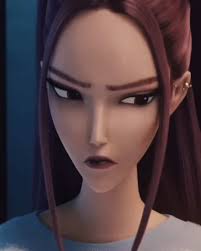
Shame in Relationships
What’s so powerful about these arcs is how we see the shame play out in their relationships. Zoey and Mira begin to soften each other’s shame. Mira doesn’t judge Zoey for her endless ideas - she smiles and treats them with fondness. Zoey embraces Mira’s jagged edges and fighting spirit. As a matter of fact, Zoey’s enthusiasm and Mira’s fighting spirit are valued in their roles as hunters. Mira’s creativity and wild energy makes for great choreography and Zoey’s colors and words make for lyrical inspiration and a welcome intensity in her rap style. They both found a place where parts of them others didn’t appreciate are wholly valued.
Their initial experiences of strength and acceptance with one another help. And all along, as two of them are opening up and going to the bathhouse, Rumi is holding back. That distance and hiding that remains in the relationship is the perfect greenhouse for shame to grow. Shame lives in the unspoken, in the hidden, and in the quiet pain and fear of rejection. And her friends feel it, complaining of her absence when they try to go to the bath house. Mira reaches out directly, asking what’s going on in Rumi’s room and on the train. The lies and avoidance probably felt like another rejection for Mira and Zoey.
That’s the sad irony to our defenses. Sometimes we build our walls so high to protect our inner selves that even the light can’t get in. That we block out the very people who matter most. And that hurts us and them.

The Turning Point: Being Seen
Rumi’s shift begins in an unexpected place: with Jinu. During their initial fight, he notices her markings and - rather than expose her - he helps her cover them. She agrees to meet him and later even initiates a meeting. As they speak more, he tells her something she’s never heard before: “I don’t think you’re a mistake.”
It’s such a simple but potent line. For Rumi I think it’s groundbreaking. For the first time, someone sees her whole self and doesn’t ask her to hide. Her voice begins to heal. She begins to heal.
In therapy we often talk about shame and vulnerability. Therapy itself is a way of taking a stand against our learned shame, because shame tells us to hide, shrink and stay silent. Healing is the opposite - we speak, reveal, and let ourselves be known. This is important because it isn’t until our true selves are seen that we can actually be accepted and loved.
The Liberation Scene
Shame isn’t defeated in a single moment. Rumi relapses when she’s publicly humiliated on stage - tricked by demons disguised as her friends rejecting her in the very ways she has most feared. She’s devastated.
But this also leads to her true breakthrough. For anyone who has experienced a truth coming to light, it can be so hard but also a relief. Now that it’s out, it’s out.
Rumi goes to see Celine and even in that moment, Celine is telling her they can hide it and lie. She won’t accept her. She offers only duty and conditional care. Covering up is called out not as a form of protection, but as another form of harm. It’s heart-wrenching, but also an important moment when she asks, “Why couldn’t you love me? All of me?”
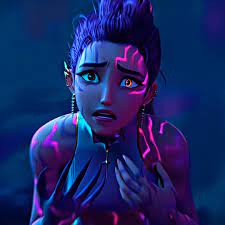
I’ve heard people express this question in so many ways in therapy, wondering why their own parents or partners or others could not just love them as they are.
She realizes here that perhaps a honmoon that requires pretending, masking, and hiding their true selves is not a true form of community or protection. She wants something real instead. Instead of hiding, she shows up exactly as she is - patterns on display, hair messy - but also meeting Gwi-Ma and the audience with her head up, unapologetic, and without trying to shrink in on herself. In therapy we call this “opposite action,” which is such a great strategy for defeating shame or fears of rejection when it not just or founded. She steps on stage and for all to see, begins to sing her truth. This act of raw honesty and vulnerability calls Mira and Zoey back to her. They each admit their own shame, standing proud as well. And as they all fight the demons, they admit that they don’t have to actually be perfect. It’s enough that they are survivors.
I couldn’t design a better message as a psychologist, therapist, mom, and fellow survivor.
The audience feels it too, connecting not with the idol-perfect Huntrix, but the real young women before them. And this time they connect in a more real and sincere way, their colors and souls joining the hunters in forming a new honmoon born of true belonging. A truer honmoon. One that allows for honesty and a truer version of themselves.
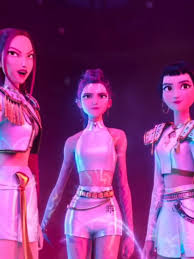
Belonging Beyond Masks
This is where KPop Demon Hunters shines brightest: in showing us that true belonging doesn’t come from fitting in or maintaining a mask. You can be adored for a persona - as the Saja boys prove - but that isn’t real connection. It’s consuming approval.
Belonging comes when we allow ourselves to be seen. That means shedding shame, even when it feels risky, and stepping into the radical truth of who we are. That’s the real honmoon. One woven from honesty, authenticity, and mutual acceptance. One strong enough to hold us, protect us, and help us become.
